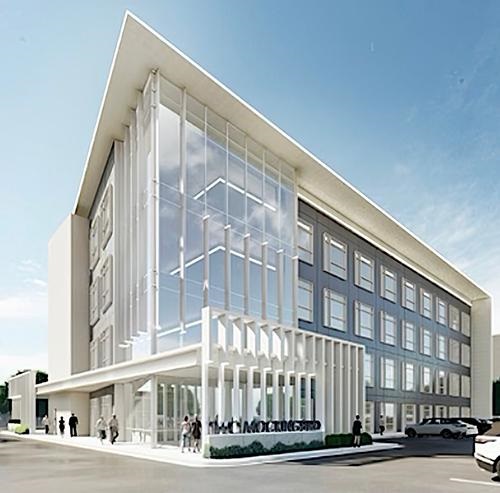New $52 Million Biosafety Level 3 Laboratory to Be Constructed in Dallas County, Texas
Level 3 bio labs handle Ebola, smallpox and other deadly diseases, and may play a role in research into the human genome
Because of the COVID-19 pandemic, there is a concerted effort to improve public health laboratories and increase the growth of bioresearch. Clinical laboratories across the country are required by law to send specimens of certain infectious diseases to public health labs for testing and analysis. The results of those tests are then reported to the federal Centers for Disease Control and Prevention (CDC), which is working to foster robust connections and relationships between clinical labs and public health labs.
One such effort was recently announced in Dallas County, Texas. It will create the Dallas County Health and Human Services Public Health Laboratory. The 75,000 square-foot level 3 biological safety lab (BSL-3) will be built from the ground up and customized to meet the requirements and specifications of the county. It will be used to study potentially lethal infectious agents or toxins that can be transmitted through the air and will be located on the north end of the Southwestern Medical District, according to Dallas Innovates.
A land transaction for a 1.6-acre purchase between Dallas County and TXRE Properties closed in April. The development of the lab is expected to cost $52 million and should be completed by late 2025 with occupancy as early as January 2026.

The graphic above is an artist rendering of what the new Dallas County Health and Human Services Public Health Laboratory may look like. For some time now, Dallas County has been working to create a hub centered around infrastructure and buildings to be used for bio development and research, public health labs, and even clinical laboratories. (Graphic copyright: 5G Studio Collaborative.)
Continuing Support for HHS
“The large-scale response required for COVID-19 demonstrated the need for the acquisition that will permit the continued support of the HHS efforts in response to the ongoing safety, containment, incident response to emerging and high consequence diseases that could operate at the peak of a crisis without hindering or being hindered by other county operations,” states a Dallas County Commissioners Court Order, D Magazine reported.
Funding for the project is coming from the Coronavirus State and Local Fiscal Recovery Funds (SLRFR) program—part of the American Rescue Plan—which is designed to help local governments respond to and recover from the COVID-19 public health emergency.
“The county currently utilizes owned facilities to provide laboratory services, testing services, and other initiatives,” according to the court order. “These facilities have performance and design shortcomings and have required significant capital expenditure for their ongoing use.
“To avoid leasing space and avoid additional capital investment into deferred and ongoing maintenance, the county has been searching for a suitable location/acquisition to collocate uses/departments into a centralized, efficient, and suitable laboratory,” the court order continued.
Lab Will Conduct Research into Potentially Fatal Diseases
The facility will pursue becoming a Biological Safety Level-3 laboratory. BSL-3 labs typically conduct research or work on microbes that can cause serious and potentially fatal disease through inhalation. These labs are required to be easily decontaminated. They must also have additional safety measures, including interlocked doors, sealed windows, floors, and walls, and filtered ventilation systems.
“The core diagnostic functions are—along with safety—related to identification, containment, security, and incident response to emerging and high consequence diseases,” the court order notes.
According to the National Institutes of Health (NIH), the actual number of BSL-3 facilities in the US is currently unknown “because federal registration is required only if select agent (National SA Registry) or NIH-funded recombinant DNA (rDNA) (Institutional Biosafety Committee [IBC]) work is conducted,” according to an article published in the journal Biosecurity and Bioterrorism: Biodefense, Strategy, Practice, and Science, titled, “BSL-3 Laboratory Practices in the United States: Comparison of Select Agent and Non–Select Agent Facilities.”
A Georgetown University article published last year concluded there are 148 institutions with BSL-3 laboratories in the US. This number was established by identifying and totaling the number of BSL-3 facilities that published research between 2006 and 2021 using PubMed Central, a full-text archive of biomedical and life sciences journal literature at the US National Institutes of Health’s National Library of Medicine (NIH/NLM).
The creation of this new biosafety lab in Dallas is consistent with the trend of investment dollars being poured into research into the human genome. This type of research, along with the creation of new facilities, can directly lead to new biomarkers that can be utilized in clinical laboratory testing and disease prevention.
—JP Schlingman
Related Information:
Dallas County Plans $52 Million Bio Lab Development Near Southwestern Medical District
Dallas County to Build New $52M Bio-Lab Facility
Coronavirus State and Local Fiscal Recovery Funds
Dallas Medical District Property Sells for New Laboratory Project
Mapping Biosafety Level-3 Laboratories by Publications
What is a BSL-3 (Biological Safety Levels) Lab?



